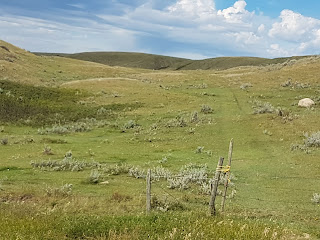The LORD of Everything . . .
 |
| Grasslands |
Psalm
24
The
earth is the Lord’s,
and everything in it,
the
world, and all who live in it;
for
he founded it on the seas
and
established it on the waters . . .
Psalm
24 follows that iconic Psalm that most of us who grew up in a church
know by heart: “The LORD is my shepherd, I shall not want . . .
etc.” Psalm 23 sings like a lullaby, an assurance of protection, of
safety, “still waters” and “green pastures,” and tables laden
with abundant food. Many have survived hard times with help from the
assurances of Psalm 23.
But
Psalm 24 paints the God of the Hebrew people as king, not as
shepherd. A triumphal hymn of conquest and praise, it presents a
different image of the God of Jacob, and Abraham, Noah and Moses:
“Who is this King of glory? The Lord strong and mighty, the
Lord mighty in battle.” Why the contrast? Or is it a
contrast? You and I are not the first to attempt reconciling the
“Lord strong and mighty” with the gentle shepherd. Some have
declared that the nature of God is unknowable, settling one question
with a larger question. Others have declared God both a forgiving and
a judgmental deity, tender and ruthless by turn.
One
thing seems clear: however we speak of the God of Israel or the God
of Christ and the church, our source will always be an image in our
minds, our imaginations, our acquired impressions, if you will. When
I close my eyes to pray, am I praying to my king or my shepherd? Do I
feel love for God and from God, or is it more accurate to say I see
myself approaching “Him” in fear and trembling, knees-shaking,
guilty? Or by this logic, are we, in fact, praying to ourselves, to
our consciences, our imaginations?
The
temptation to externalize God, to deify “Him” is always there,
and is probably encouraged by the king imagery of Psalm 24. Maybe
even by the shepherd imagery in 23. The debate about God as person or
as spirit is very old, and its quite possible that insisting on the
latter would leave many in a dilemma of understanding. Seeing God as
a person—the predominant Old Testament imagery—has
the downside, though, of making it difficult to embrace the god in
others, in nature, in the everyday.
“But
a time is coming and has now come when the true worshipers will
worship the Father in spirit and in truth, for the Father is seeking
such as these to worship Him. God is Spirit, and His worshipers must
worship him in spirit and in truth.” (John 4: 23, 24).
Although
one should never pick out one or two scriptures to “put an argument
to rest,” Psalm 24’s opening declaration (The
earth is the Lord’s,
and everything in it, the
world, and all who live in it . . .) can at least reinforce in us the
understanding that Creation is a unity,
that to seek the LORD one needn’t go as far as a distant heaven,
since we’re standing on the LORD, surrounded by our LORD, talking
to our LORD when we meet our neighbour.
And
most importantly of all, that we are all one people, we are all
children of the one Creation. Let’s let our behaviour—toward one
another, toward the earth that feeds us, toward the waters that
sustain us, toward the air we breathe—reflect our allegiance to the
Spirit-God that made us all. It is, after all, “His” world.



Comments
Post a Comment